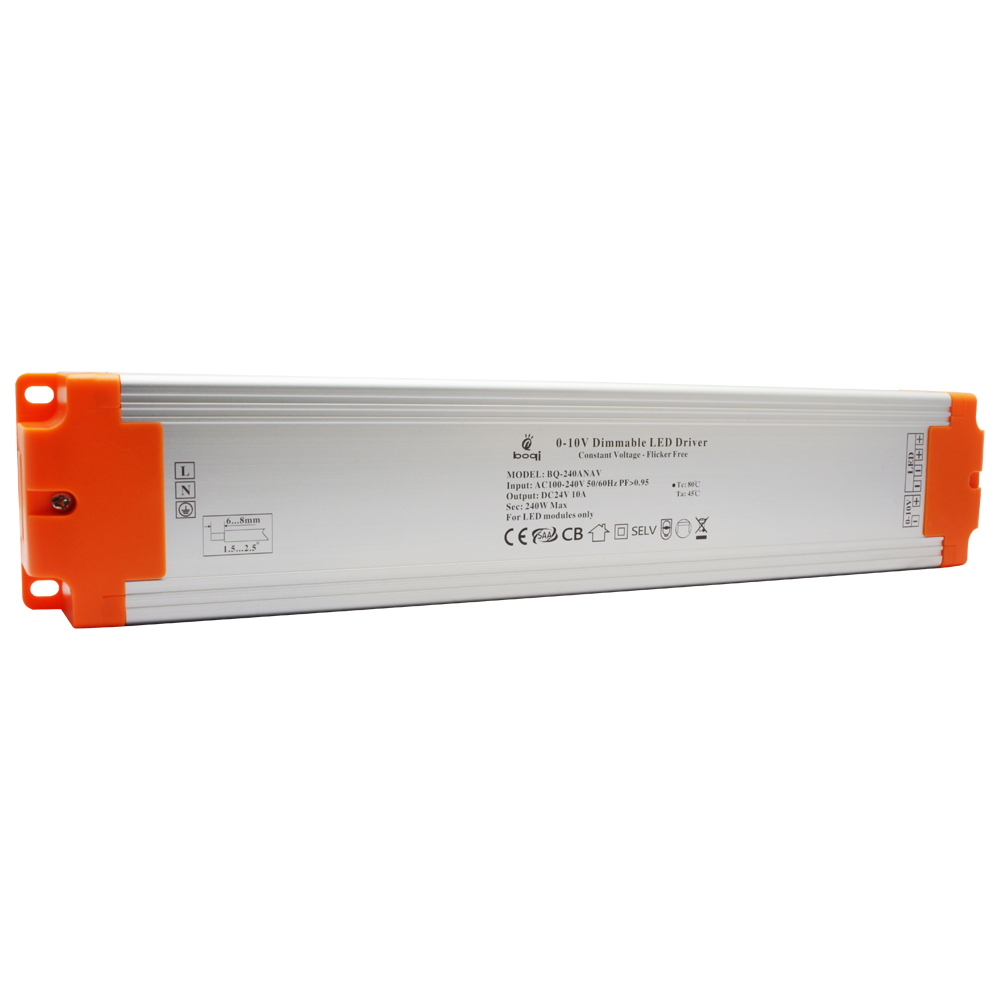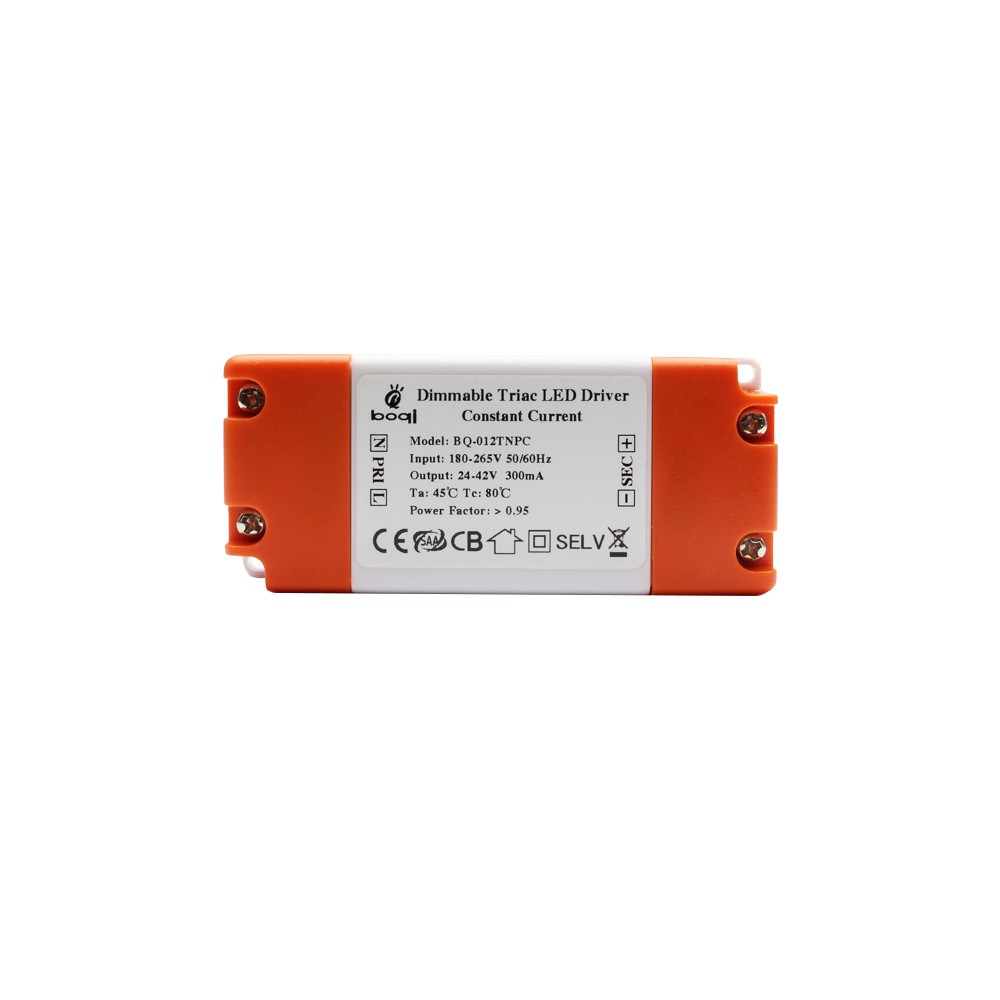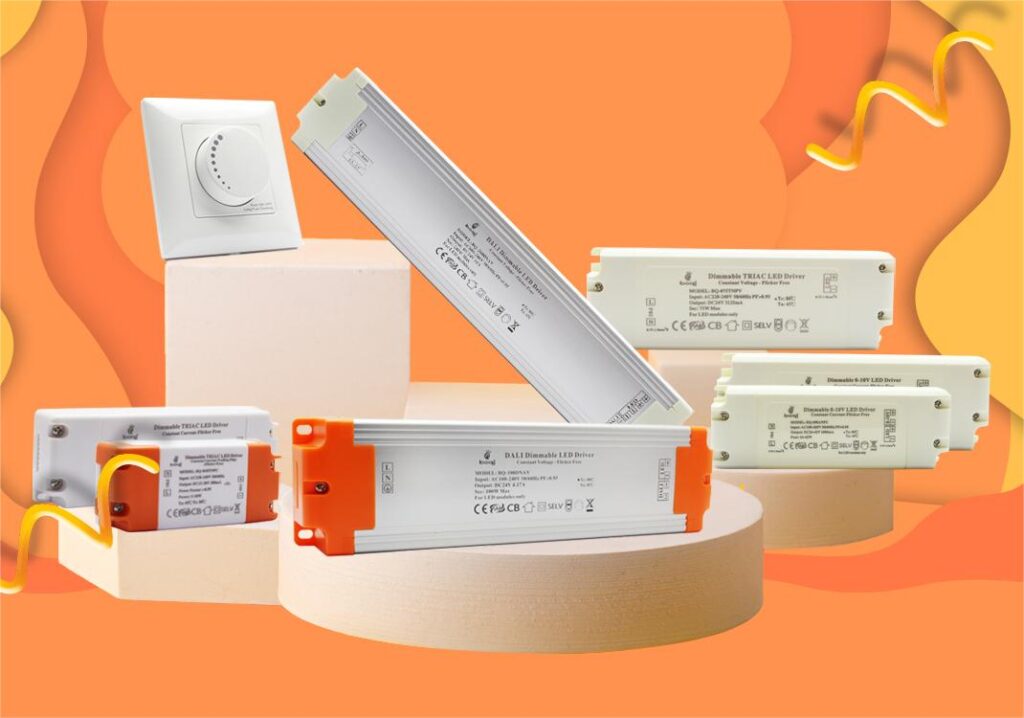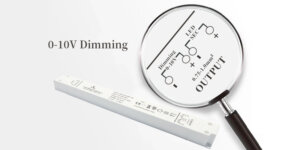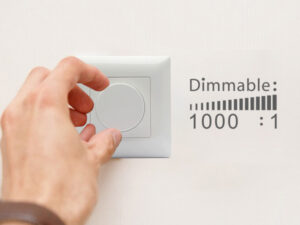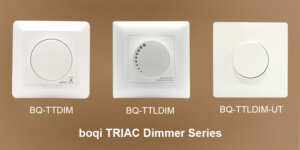Il cablaggio delle strisce LED può sembrare scoraggiante. Ma, con le giuste indicazioni, si tratta di un processo semplice. Può migliorare il vostro spazio in modo meraviglioso. È per gli amanti del fai-da-te, per i proprietari di case che vogliono aggiungere atmosfera e per gli elettricisti alle prese con un nuovo progetto. Questa guida vi semplificherà il cablaggio.
Per cablare le strisce LED, iniziare a identificare il tipo di striscia (monocolore, RGB o RGBW). Collegare i fili positivi e negativi ai terminali corrispondenti dell'alimentatore o del controller. Per le strisce RGB, far corrispondere i colori (rosso, verde, blu) ai terminali appropriati. Assicurarsi che tutti i collegamenti siano saldi e seguire lo schema di cablaggio incluso per istruzioni precise.
Approfondiamo i dettagli del cablaggio dei vari tipi di strisce LED. In questo modo avrete le conoscenze e la sicurezza necessarie per farlo correttamente.
- Comprendere il collegamento in parallelo: Semplificato
- Caduta di tensione: una semplice spiegazione
- Amplificatore PWM: Trasformare il complesso in semplice
- Tipi di strisce luminose a LED
- Come cablare le strisce LED monocolore
- Cablaggio di strisce LED monocolore con driver LED non dimmerabili
- Cablaggio di strisce luminose LED monocolore con driver LED dimmerabili
- Cablaggio di strisce luminose LED monocolore con controller LED
- Cablaggio di strisce luminose LED monocolore con decoder DMX512
- Come cablare le strisce LED bianche sintonizzabili
- Cablaggio di strisce LED bianche sintonizzabili con driver LED dimmerabili
- Cablaggio di strisce LED bianche sintonizzabili con controller LED
- Cablaggio di strisce LED bianche sintonizzabili con decoder DMX512
- Striscia LED bianca a due fili sintonizzabile
- Come cablare le strisce LED RGB
- Cablaggio di strisce LED RGB con driver LED dimmerabili
- Cablaggio delle strisce LED RGB con i controller LED
- Cablaggio di strisce luminose LED RGB con decoder DMX512
- Come cablare le strisce LED RGBW
- Cablaggio di strisce luminose LED RGBW con driver LED dimmerabili
- Cablaggio delle strisce LED RGBW con i controllori LED
- Cablaggio di strisce luminose LED RGBW con decoder DMX512
- Come cablare le strisce LED RGB e CCT
- Cablaggio di strisce luminose LED RGBW con driver LED dimmerabili
- Cablaggio delle strisce LED RGBW con i controllori LED
- Cablaggio di strisce luminose LED RGBW con decoder DMX512
- Come cablare le strisce LED indirizzabili
- Come cablare le strisce luminose a LED indirizzabili SPI
- Strisce luminose a LED indirizzabili SPI con il solo canale dati
- Strisce luminose a LED indirizzabili SPI con canali di dati e orologio
- Strisce luminose a LED indirizzabili SPI con canali dati e dati di backup
- Come cablare le strisce LED indirizzabili DMX512
- Domande frequenti
- Conclusione
- Chiusura
Comprendere il collegamento in parallelo: Semplificato
I collegamenti in parallelo sono fondamentali nell'illuminazione a strisce LED. Ogni segmento della striscia è cablato in serie, il che significa che le tensioni di funzionamento si sommano, fornendo la tensione superiore necessaria. Tutti i segmenti sono cablati in parallelo e ricevono la stessa tensione, ma l'assorbimento di corrente aumenta con la lunghezza della striscia. Utilizzare collegamenti in parallelo. Assicurano che ogni segmento della striscia riceva una tensione costante. In questo modo si evitano problemi come la luminosità non uniforme o lo sfarfallio. Questa configurazione è fondamentale per le strisce LED di lunga durata. Mantiene la luce stabile e uniforme. La comprensione delle basi del cablaggio in parallelo può migliorare notevolmente l'efficacia e l'affidabilità della vostra installazione di illuminazione a LED.



Caduta di tensione: una semplice spiegazione
La caduta di tensione si verifica quando la tensione alla fine della striscia è inferiore a quella dell'inizio. Questo può causare la diminuzione della luminosità dei LED all'estremità. Per ridurre la caduta di tensione, è possibile utilizzare fili più spessi, strisce più corte o iniettare l'alimentazione in più punti lungo la striscia. È essenziale pianificare attentamente l'installazione per ridurre al minimo la caduta di tensione, soprattutto nei tratti più lunghi. Un buon metodo è quello di utilizzare amplificatori o booster di potenza. Utilizzateli a intervalli regolari. Essi contribuiscono a mantenere una tensione costante sulla striscia. Inoltre, la scelta di un alimentatore migliore con una capacità sufficiente può ridurre il rischio di caduta di tensione. Comprendendo e correggendo la caduta di tensione, è possibile garantire il buon funzionamento delle strisce LED. Forniranno una luce uniforme su tutta l'installazione.
Amplificatore PWM: Trasformare il complesso in semplice
Un amplificatore a modulazione di larghezza di impulso (PWM) potenzia il segnale alle strisce LED, consentendo una luminosità costante su strisce lunghe. Garantisce che il segnale di alimentazione rimanga forte, impedendo l'oscuramento o lo sfarfallio. Gli amplificatori PWM sono utili nelle installazioni di grandi dimensioni. Mantengono uniforme l'emissione luminosa, un aspetto fondamentale. Questi amplificatori rigenerano il segnale PWM. Estendono la portata effettiva delle strisce LED. In questo modo si garantisce che ogni sezione riceva la giusta tensione e corrente. L'installazione degli amplificatori PWM è semplice. È possibile aggiungerli alla propria configurazione. Se installati e configurati correttamente, gli amplificatori PWM possono migliorare notevolmente l'illuminazione delle strisce LED. Possono aumentare le prestazioni e la longevità.
Tipi di strisce luminose a LED
Le strisce LED sono disponibili in vari tipi, tra cui monocolore, RGB (rosso, verde, blu), RGBW (rosso, verde, blu, bianco) e bianco sintonizzabile. Ogni tipo richiede cablaggi e controller diversi. Le strisce monocolore sono le più semplici, con solo due fili per i collegamenti positivi e negativi. Le strisce RGB aggiungono tre canali di colore e richiedono un controller per miscelare i colori. Le strisce RGBW includono un canale bianco aggiuntivo per opzioni di illuminazione più sfumate. Le strisce bianche sintonizzabili consentono di regolare la temperatura del colore, offrendo una gamma di luce bianca da calda a fredda. Conoscere le differenze tra questi tipi di strisce LED può aiutare a scegliere il prodotto giusto per le proprie esigenze. Inoltre, garantirà un'impostazione e un utilizzo corretti.
Come cablare le strisce LED monocolore
Cablaggio di strisce LED monocolore con driver LED non dimmerabili
Per i driver LED non dimmerabili, collegare il filo positivo della striscia al terminale positivo del driver. Quindi, collegare il filo negativo della striscia al terminale negativo del driver. Fissare tutti i collegamenti e accendere. Questo semplice metodo di cablaggio è ottimo per le installazioni di base. Non richiedono la dimmerazione. I driver non dimmerabili forniscono un'uscita costante. Questo garantisce che le strisce LED brillino al meglio. Quando si cablano più strisce, è importante assicurarsi che la potenza totale non superi la capacità del driver. È fondamentale fissare tutti i collegamenti. Seguite le istruzioni del produttore. In questo modo si evitano problemi elettrici e si garantisce un'installazione sicura e affidabile.
Cablaggio di strisce luminose LED monocolore con driver LED dimmerabiles
I driver LED dimmerabili consentono di regolare la luminosità. Collegare la striscia al driver come descritto sopra. Seguire lo schema di cablaggio specifico per il tipo di dimmer:
– Schema di collegamento del driver LED dimmerabile 0-10V
Un driver dimmerabile 0-10V utilizza un segnale di controllo a bassa tensione per regolare la luminosità. Collegare il dimmer 0-10V ai terminali di controllo del driver, assicurando la corretta polarità. Questa configurazione consente una regolazione uniforme dell'intera gamma.

– Triac Dimmable LED Driver Connection Diagram
Triac dimmers work with AC phase-cut dimming. Connect the driver to a compatible triac dimmer switch, ensuring that the driver’s input matches the dimmer’s output. This method provides a familiar dimming experience similar to traditional incandescent bulbs.

– DALI Dimmable LED Driver Connection Diagram
DALI (Digital Addressable Lighting Interface) dimmers offer precise control and programmability. Connect the DALI control lines to the driver’s DALI input terminals. This setup is ideal for complex lighting systems requiring advanced control features.

Cablaggio di strisce luminose LED monocolore con controller LED
LED controllers provide more flexibility in controlling the lights. Connect the strip to the controller. Make sure the positive and negative wires match the controller’s terminals. Controllers allow for various effects, such as dimming, flashing, and custom lighting patterns. Ensure that the controller is compatible with your LED strip and power supply. Securing the connections properly is key. Following the manufacturer’s guidelines will ensure reliable operation and prevent potential issues.
Without PWM amplifier
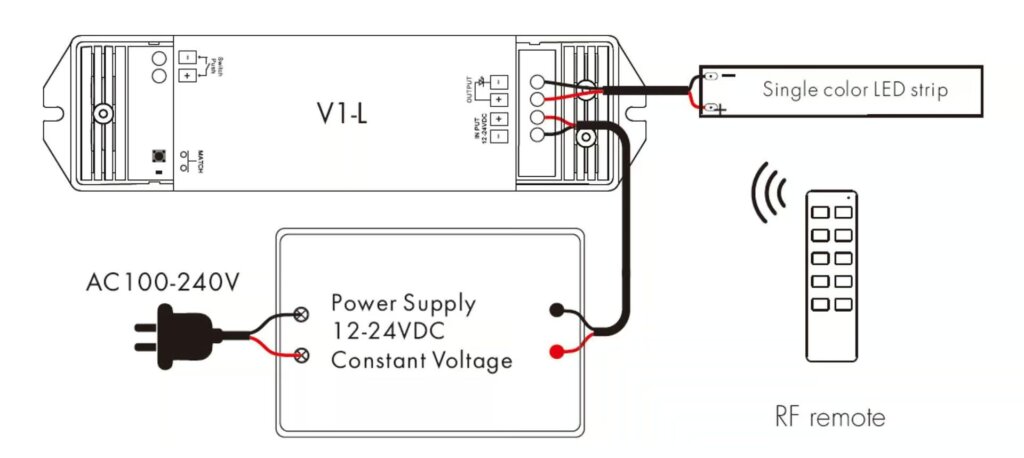
With PWM amplifier
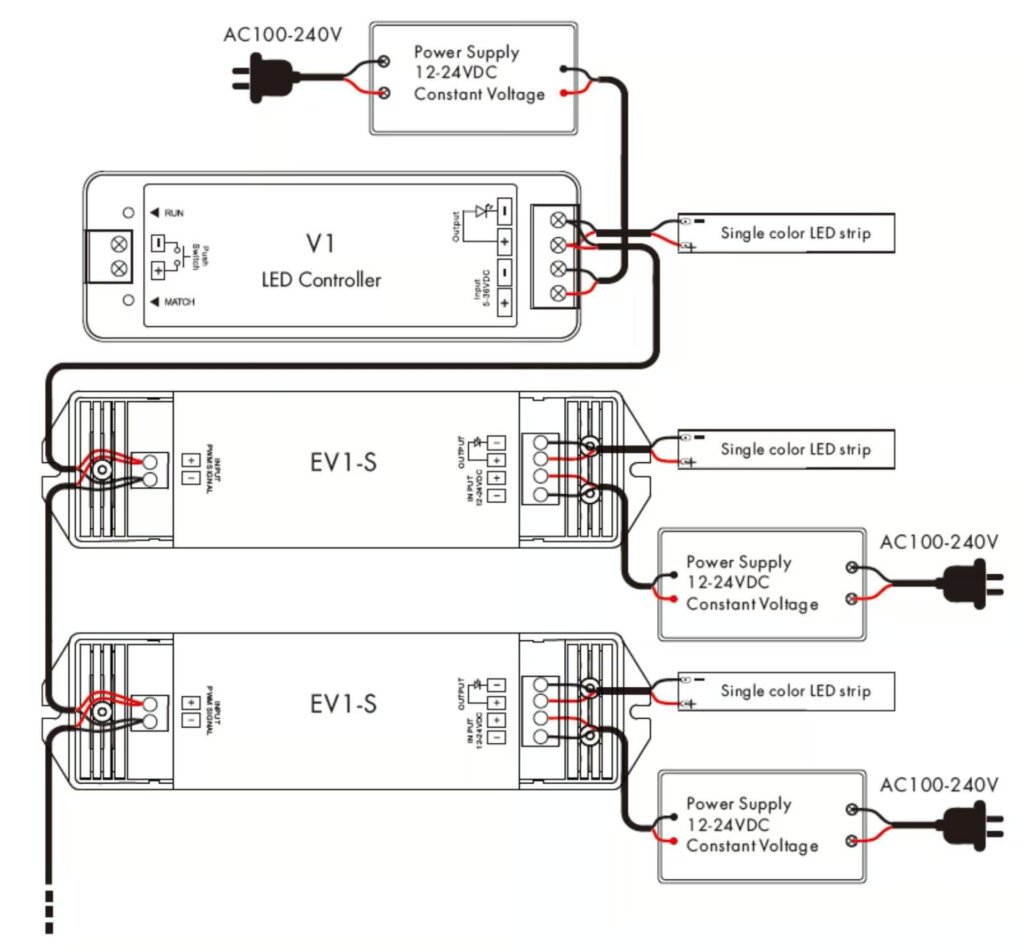
Cablaggio di strisce luminose LED monocolore con decoder DMX512
DMX512 decoders are used for advanced lighting setups. Connect the strip to the decoder, matching the positive and negative wires to the correct terminals. DMX512 is a digital communication protocol. It is used for lighting control and provides precise control over many channels. This setup is common in stage lighting. It is also used in architectural lighting and other pro applications. Ensure the DMX512 decoder is set up right. Connect it to the DMX controller for best performance.

Come cablare le strisce LED bianche sintonizzabili
Cablaggio di strisce LED bianche sintonizzabili con driver LED dimmerabili
Tunable white LED strips allow for color temperature adjustments. Connect the wires as per the driver’s instructions, ensuring proper connections for both color temperature and brightness control. Tunable white strips typically have additional control lines for adjusting the color temperature. These strips can transition from warm white to cool white, providing versatile lighting options. Ensure that your dimmable LED driver is compatible with tunable white strips and that all connections are secure for reliable operation.
DALI DT8 Tunable White LED Driver
DALI DT8 drivers are used for precise control of tunable white strips. Follow the wiring diagram provided by the manufacturer. DALI DT8 drivers support tunable white LED strips. They allow independent control of brightness and color temperature. This advanced control capability is ideal for applications requiring dynamic lighting environments. Properly wiring and configuring the DALI DT8 driver ensures smooth operation and optimal performance of your tunable white LED strips.

Cablaggio di strisce LED bianche sintonizzabili con controller LED
Connect the tunable white strip to the controller, matching the positive and negative terminals. Ensure secure connections for reliable operation. LED controllers for tunable white strips allow for precise adjustments in color temperature and brightness. These controllers often come with remote controls or can be integrated into smart home systems for added convenience. Proper installation and configuration of the controller ensure consistent and reliable operation.
Without PWM amplifier

Cablaggio di strisce LED bianche sintonizzabili con decoder DMX512

Use a DMX512 decoder for tunable white strips in advanced setups. Connect the strip to the decoder, following the wiring diagram for proper installation. DMX512 decoders provide fine control over color temperature and brightness. They are ideal for professional lighting. Ensure that the decoder is correctly connected to the DMX controller and that all connections are secure for optimal performance.
Striscia LED bianca a due fili sintonizzabile
Simpler tunable white strips use two wires for color temperature control. Connect these wires to the appropriate terminals on your controller or driver. This type of tunable white strip typically has a simpler wiring configuration, making it easier to install. However, it may offer fewer control options compared to more advanced tunable white systems. Ensure that your controller or driver is compatible with the two-wire configuration for reliable operation.

Come cablare le strisce LED RGB
Cablaggio di strisce LED RGB con driver LED dimmerabili
Connect the RGB strip to the dimmable driver, matching the red, green, and blue wires to the corresponding terminals. Use the wiring diagram provided. Dimmable drivers for RGB strips allow you to adjust the brightness of the entire strip. However, color control will require an additional RGB controller. Ensure that all connections are secure and that the driver is compatible with your RGB strip for reliable operation.
DALI DT8 RGB LED Driver
For advanced RGB control, use a DALI DT8 driver. Follow the manufacturer’s wiring diagram for precise installation. DALI DT8 drivers provide separate control over each color. This allows for complex lighting and precise color mixing. This advanced control is great for apps that need dynamic lighting. They need lighting that can be customized. Proper installation and setup of the DALI DT8 driver make sure your RGB LED strips work well. They will have the best performance.

Cablaggio delle strisce LED RGB con i controller LED
Connect the RGB strip to the controller, ensuring each color wire is connected to the appropriate
terminal. RGB controllers allow for various lighting effects, such as color changing, flashing, and custom patterns. Ensure that the controller is compatible with your RGB strip and power supply. Properly securing the connections and following the manufacturer’s guidelines will help ensure reliable operation and prevent potential issues.
Without PWM amplifier
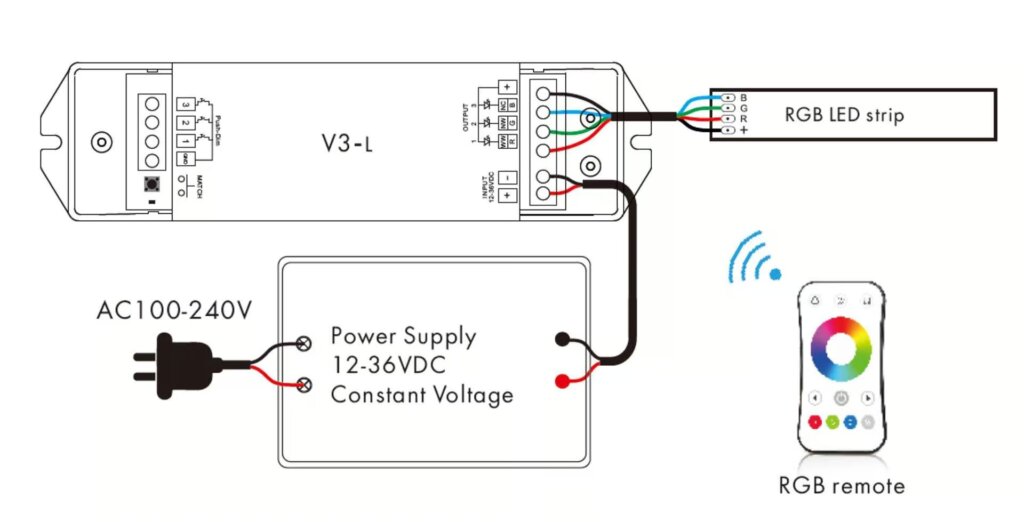
With PWM amplifier

Cablaggio di strisce luminose LED RGB con decoder DMX512
Use a DMX512 decoder for RGB strips in complex setups. Follow the wiring diagram to ensure correct installation. DMX512 decoders provide precise control over each color channel, allowing for intricate lighting effects and precise color mixing. This setup is commonly used in professional lighting applications, such as stage lighting and architectural lighting. Make sure the DMX512 decoder is set up right. Connect it to the DMX controller for the best performance.

Come cablare le strisce LED RGBW
Cablaggio di strisce luminose LED RGBW con driver LED dimmerabili
Connect the RGBW strip to the dimmable driver, ensuring all color wires (red, green, blue, white) are connected correctly. Dimmable drivers for RGBW strips allow you to adjust the brightness of the entire strip. However, color control will require an additional RGBW controller. Ensure that all connections are secure and that the driver is compatible with your RGBW strip for reliable operation.
DALI DT8 RGBW LED Driver
For advanced RGBW control, use a DALI DT8 driver. Follow the manufacturer’s wiring instructions. DALI DT8 drivers provide separate control over each color. This allows for complex lighting effects and precise color mixing. This advanced control is great for applications. They need dynamic and customizable lighting. The DT8 driver must be properly installed and configured. This ensures smooth and optimal performance of your RGBW LED strips.

Cablaggio delle strisce LED RGBW con i controllori LED
Connect the RGBW strip to the controller, matching all color wires to the correct terminals. RGBW controllers allow for various lighting effects, such as color changing, flashing, and custom patterns. Ensure that the controller is compatible with your RGBW strip and power supply. Securing the connections properly and following the manufacturer’s guidelines will help. It will ensure reliable operation and prevent issues.
Without PWM amplifier
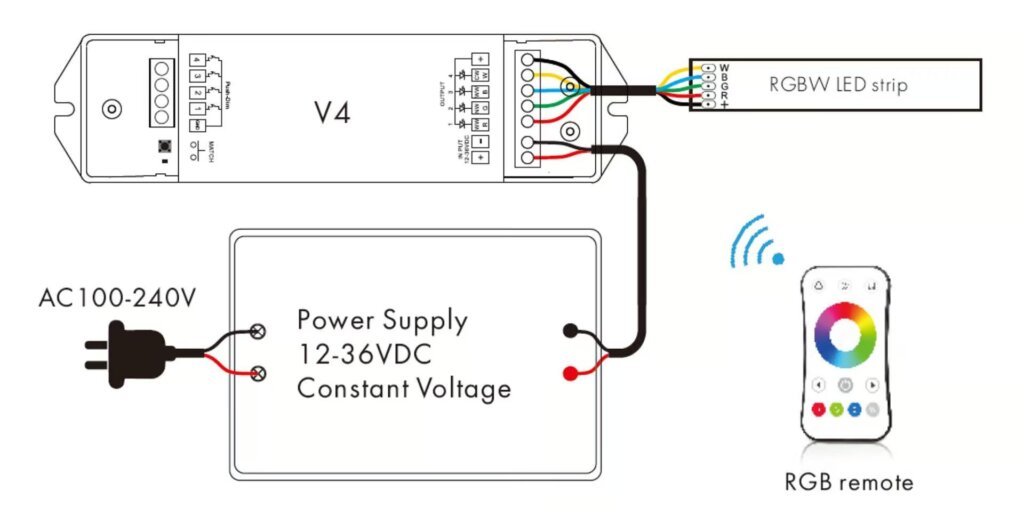
With PWM amplifier

Cablaggio di strisce luminose LED RGBW con decoder DMX512
Use a DMX512 decoder for RGBW strips in advanced setups. Follow the wiring diagram for proper installation. DMX512 decoders give precise control over each color channel. They allow for complex lighting effects and exact color mixing. This setup is common in professional lighting. It is used for stage and architectural lighting. Make sure the DMX512 decoder is set up and connected to the DMX controller. This is needed for best performance.

Come cablare le strisce LED RGB e CCT
Cablaggio di strisce luminose LED RGBW con driver LED dimmerabili
Follow the wiring diagram to connect the RGBW strip to a dimmable driver, ensuring all connections are secure. Dimmable drivers for RGBW strips allow you to adjust the brightness of the entire strip. However, color control will require an additional RGBW controller. Ensure that all connections are secure and that the driver is compatible with your RGBW strip for reliable operation.

Cablaggio delle strisce LED RGBW con i controllori LED
Connect the strip to the controller, matching the wires to the appropriate terminals. RGBW controllers allow for various lighting effects, such as color changing, flashing, and custom patterns. Ensure that the controller is compatible with your RGBW strip and power supply. Properly securing the connections and following the manufacturer’s guidelines will help ensure reliable operation and prevent potential issues.
Without PWM amplifier

With PWM amplifier

Cablaggio di strisce luminose LED RGBW con decoder DMX512
Use a DMX512 decoder for complex setups. Follow the wiring diagram to ensure proper installation. DMX512 decoders provide precise control over each color channel. They allow for complex lighting effects and exact color mixing. This setup is commonly used in professional lighting applications, such as stage lighting and architectural lighting. Ensure the DMX512 decoder is properly configured. Connect it to the DMX controller for best performance.

Come cablare le strisce LED indirizzabili
Come cablare le strisce luminose a LED indirizzabili SPI
Connect the data and power wires of the SPI addressable strip to the controller, following the wiring diagram provided. Addressable LED strips allow for individual control of each LED, enabling complex lighting effects and patterns. Ensure that the controller is compatible with your SPI addressable strip and that all connections are secure. Properly configuring the controller and following the manufacturer’s instructions will help ensure reliable operation and prevent potential issues.
Strisce luminose a LED indirizzabili SPI con il solo canale dati
Ensure the data wire is connected securely to the controller. This setup allows for basic control of addressable LEDs. It lets you make custom lighting effects. Properly securing the data wire and following the wiring diagram will help ensure reliable operation and prevent potential issues.

Strisce luminose a LED indirizzabili SPI con canali di dati e orologio
Connect both data and clock wires to the controller, ensuring secure connections. This setup allows for more precise control of the addressable LEDs, enabling complex lighting effects and patterns. Properly configuring the controller and following the manufacturer’s instructions will help ensure reliable operation and prevent potential issues.

Strisce luminose a LED indirizzabili SPI con canali dati e dati di backup
Follow the wiring diagram to connect data, clock, and backup data wires to the controller. This configuration provides redundancy, ensuring reliable operation even if one data channel fails. Securing all connections properly is key. Following the manufacturer’s instructions will help. It ensures reliable operation and prevents potential issues.

Come cablare le strisce LED indirizzabili DMX512
Use a DMX512 decoder for addressable strips. Follow the wiring diagram for proper installation. DMX512 decoders provide precise control over each LED, enabling complex lighting effects and patterns. This setup is commonly used in professional lighting applications, such as stage lighting and architectural lighting. Ensure the DMX512 decoder is set up right. Connect it to the DMX controller. This is key for top performance.

Domande frequenti
- How are strip LEDs wired?
- For each segment, the LEDs are wired in series, which means the operating voltages are added up, giving the higher voltage needed. All segments are wired in parallel, so they receive the same voltage, but the current draw increases with the length of the strip. Understanding this wiring method helps maintain consistent brightness and prevents issues such as uneven lighting or flickering.
- What are the colors of the wires on LED light strips?
- RGB strip light has a 4-wire connection: green, red, blue for the LEDs, and black/white for the common +12V connection. Properly matching these wires to the corresponding terminals on the controller or power supply ensures correct operation and color mixing.
- What are 4 wires in LED strip light?
- For RGB strips, you need 4 wires: one neutral (yellow) and the rest control the 3 LED colors (Red, Green, Blue). Connecting these wires correctly ensures proper color control and operation of the strip.
- How many wires for an LED strip?
- The RGBW LED strip has five wires: red, green, blue, white, and positive. Connect the LED light strip to the corresponding mark on the RGBW LED light controller. Ensuring all connections are secure and following the wiring diagram provided by the manufacturer will help prevent potential issues and ensure reliable operation.
Conclusione
Wiring LED strip lights don’t have to be intimidating. With this guide, you now have the knowledge to tackle various types of LED strip lights, ensuring a successful and safe installation. Happy lighting!
Chiusura
La scelta dei driver LED dimmerabili Flicker-Free più adatti è fondamentale per ottimizzare l'illuminazione, migliorando così il benessere e il comfort generale. L'assenza di sfarfallio è fondamentale per il livello di comfort percepito negli spazi abitativi.
In questo articolo, approfondiamo i seguenti aspetti per guidarvi nella scelta dei driver LED dimmerabili senza sfarfallio ideali:
Esploreremo le caratteristiche essenziali come le specifiche, la compatibilità e l'efficienza per evitare lo sfarfallio dell'illuminazione. Inoltre, discuteremo l'importanza dell'alta frequenza PWM per ottenere risultati privi di sfarfallio nella serie di driver LED dimmerabili.
Acquista Driver LED dimmerabili da boqi
Essere informati sulle cause prevalenti dello sfarfallio della luce è essenziale, ma il compito di selezionare il driver LED dimmerabile adatto è ancora a portata di mano. Per ottenere gli effetti di illuminazione e dimmerazione desiderati, è indispensabile rivolgersi a un produttore di driver LED affidabile. boqi si distingue come rinomato produttore di driver LED dimmerabili, offrendo una serie di driver, dimmer e controller privi di sfarfallio. La gamma di prodotti comprende driver LED TRIAC, 0-10V e DALI, dimmer e controller.
Con basi produttive in Cina, l'azienda è in grado di soddisfare le esigenze e le specifiche dei suoi clienti. Per richieste relative alle vostre esigenze di driver o controller per LED, non esitate a contattarci, per permetterci di assistervi nel perfezionamento delle vostre scelte.

